C <<< Author: D >>> E
Jump to:
Michael Daley |
Dennis Daly |
Lucille Lang Day |
Teneice Durrant Delgado |
William Delman |
Thad DeVassie |
Jesse Mavro Diamond |
Diana Der-Hovanessian |
Joseph DeRoche |
Ellen Devlin |
T. M. De Vos |
Svet DiNahum |
Carol Dine |
Milan Djurasovic |
Susan Donnelly |
Rodica Draghincescu |
Sherri Felt Dratfield |
Alexander G. Dryer |
John Dufresne |
Milutin Durickovic
Michael Daley
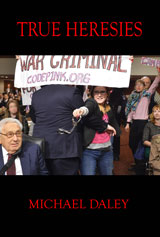 TRUE HERESIES by Michael Daley
TRUE HERESIES by Michael Daley
Červená Barva Press, 2022-
Michael Daley was born and raised in Dorchester, Massachusetts. He holds a B.A. from the University of Massachusetts and an M.F.A. from the University of Washington. His work has been awarded by Seattle Arts Commission, Washington State Arts Commission, Massachusetts Cultural Council, Fessenden Foundation, National Endowment of the Humanities, Fulbright, The Skagit River Poetry Foundation, and The Poets House Trust. A retired teacher, he lives near Deception Pass in Washington.
True Heresies is a cocktail of rage, anti-poems, and dissonant songs; this collection takes a swing or two at several revered institutions and dogmata. Some of the topics addressed here are exhumed from contemporary headlines, historical events often obscured by our collective distractions; at the unconscious fringe of philosophical meddling, some of these poems voice the suppressed terrors of today’s imminent dystopia. True Heresies calls out from necessity that shout in the street that is divine while remaining profoundly human. In an age when taking anything on faith is a challenge, these poems like bells peal forth their questions.
Mouth-filling! Mind-bending! A total trip! The images, references, and connections come so fast and furious, it's hard to catch my breath! These poems have some serious juice-the first one is SO intense-it seems to contain the outlines of all the rest-and from there, the poems slow a bit, and focus more closely, as if through squinted eyes, but never losing momentum.
-Marjorie Rommel, Poet Laureate Emerita, Auburn, WashingtonI have no idea how these poems were conceived, whether in a boil after two weeks in the darkest recesses of a cave, or upon watching disastrous election returns on a continuous loop, or as one poem title suggests, at 35,000 feet while listening to The Odyssey, but they are bursting with classical and backwoods tragedies, passions, and humors (clever and ill), and they are excellent, challenging company.
-Kathleen Flenniken, former Washington State Poet LaureateMichael Daley's poems are waiting for a world to be finished (and that is meant in both senses of the word). They are both powerfully evocative of the nothingness holding the living in its thrall and the dialectical affirmations of its images, whose textures confront that nothingness and insist on overcoming its negations. A book of poems that strengthens the soul.
-Jack Hirschman, Poet Laureate Emeritus, San Francisco, CaliforniaTrue Heresies is an American original, filled to overflowing with a unique voice and an idiosyncratic turn of mind. Daley's words and images can make a reader's head spin for a long time after the book is closed. It will enlarge your perceptions of what poetry can do. He makes conventional poems taste like sour milk. His work can fleece the reader raw.
-Louis Phillips, author of How Wide the Meadow"Great literature," Ezra Pound famously said, "is simply language charged with meaning to the utmost possible degree." Michael Daley's poems most certainly are highly charged. "Language," he writes in one poem, "is tied to every atom." And that charge creates a kind of nuclear fusion that bonds music to meaning. In True Heresies, the music is often furious and symphonic, the meaning often a savage reflection of a fractured age, a time of climate disruption we ourselves have brought on and, as of now, appear to be doing very little to prevent what seems like a chain reaction. Daley's poems are the Greek chorus, the heretics who speak the sometimes-unspeakable truths we wish we could avoid.
-Ed Harkness, author of The Law of the UnforeseenCover photo: © Jay Mallin/ZUMA Press
$18.00 | ISBN: 978-1-950063-63-5 | 96 Pages
Dennis Daly
 Twenty-one Ghazals by Alisher Navoiy
Twenty-one Ghazals by Alisher Navoiy
Translated from the Uzbek by Dennis Daly
Červená Barva Press, 2016-
Dennis Daly lives in Salem, Massachusetts with his wife Joanne. They have four adult children. Daly graduated from Boston College and has an MA in English Literature from Northeastern University. He has published three books of poetry: The Custom House (Ibbetson Street Press, 2012), Sophocles' Ajax, a Modern Translation (Wilderness House Press, 2012) and Night Walking with Nathaniel (Dos Madres Press, 2014). Daly's Sophocles' Ajax was subsequently performed at Skidmore College in a production sponsored by that college's Classics Department. Among other jobs Daly has worked as a Union Leader of a 9000 member industrial local, and as a city department head. He has traveled widely in Central Asia. Visit his blog at dennisfdaly.blogspot.com.
"Tulip fields blaze the face of my soul's fire?." So begins one of the twenty-one ghazals in Dennis Daly's elegant translation of the work of the fifteenth-century poet, Alisher Navoiy. The fire that burns through these poems is complemented by stunning illustrations from the era chosen with care by the translator that set off their own quiet conflagrations. In both illumination and interpretation, Daly's skill as wordsmith and designer is coruscating. We are indebted to him for introducing us to this poet and his passion.
-Tom Daley, author of House You Cannot Reach: Poems in the Voice of My Mother and other PoemsDark-eyed ones come, revealing their inner selves. Alisher Navoiy, or Nizam-al-Din 'Ali-Shir, a fifteenth century poet, mystic and artist, is reawakened in Daly's sublime translations. True to their spirit yet infused with a modern idiom, these ghazals tremble on the tongue, sparkle on the sheaf. A body in flames fires a path through the wilderness, a pinch of skin reminds how close we remain. Here at the source, a cloud hovers. Delectable, delicate, dangerous ... finally, a denouement.
$18.00 | ISBN: 978-0-9966894-6-5 | 62 Pages | In Stock
-Marc Vincenz, author of Becoming the Sound of Bees
Lucille Lang Day
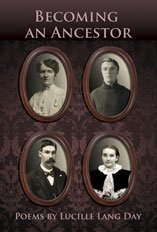 Becoming an Ancestor Poems by Lucille Lang Day
Becoming an Ancestor Poems by Lucille Lang Day
Červená Barva Press, 2015-
Lucille Lang Day is the author of nine previous poetry collections and chapbooks, including The Curvature of Blue, The Book of Answers, and Infinities. Her first poetry collection, Self-Portrait with Hand Microscope, received the Joseph Henry Jackson Award in Literature; her most recent chapbook, Dreaming of Sunflowers: Museum Poems, won the Blue Light Poetry Award. She has also published a children’s book, Chain Letter, and a memoir, Married at Fourteen: A True Story, which received a PEN Oakland Josephine Miles Literary Award and was a finalist for the Northern California Book Award in Creative Nonfiction. Day earned her M.F.A. in creative writing at San Francisco State University and her Ph.D. in science/mathematics education at the University of California at Berkeley. The founder and director of a small press, Scarlet Tanager Books, she also served for seventeen years as the director of the Hall of Health, an interactive museum in Berkeley. She lives in Oakland, California, with her husband, writer Richard Michael Levine. Her website is http://www.lucillelangday.com.
"The poems in Becoming an Ancestor begin in autobiography, move into history, and branch backward and forward through genealogy, offering instruction on the natural world along the way. Lucille Lang Day recreates her ancestors with scrupulous detail and often stunning images until her poems read like the history of anyone "born of the myths of Europe/and North America." These myths propel Day to tell us of migrations, mutations, secrets, heartbreak, disappointments, defiance, death, and resilience—in other words, of life in all its complexity as she shows us all "which way is home" in our shared fate of becoming ancestors."
—Lynne Knight, author of Again"Soulfully thrilling, the poems in Becoming an Ancestor constitute—historically, geographically, emotionally, caringly—a mindful poet's family picture album. Following centuries of fateful migrations, Lucille Lang Day becomes the California teller of tales that wow us with her own intimate versions of how need, time and again, restores our lives to living streams of love."
—Al Young, California Poet Laureate Emeritus"At the poetic heart of Lucille Lang Day's Becoming an Ancestor is a series of vivid historical poems starting in the early 1600s when 13-year-old Elizabeth sails to Plymouth on the Mayflower. Rowland is in the Gold Rush, Nathan in the Union Army. Old maid Angenette has an out-of-wedlock baby with a Wampanoag Indian. The ancestors tell Day, "Welcome home. The elders have been waiting for you./Listen to their drums, the beat/of your own heart." As the poet comes closer to becoming an ancestor herself, she details her losses and her fears, and she worries whether she is creating a masterpiece or an old pot. Read this old pot, and you will find the hand of a master."
—Penelope Scambly Schott, author of Lillie Was a Goddess, Lillie Was a Whore"Becoming an Ancestor carries us from the very beginning of this great clock-universe through human migrations to the bitter end, where however a horned lark is singing beside a field of silver hairgrass in winter. When this confluence produces Lucille Lang Day, who sings the world as both a family member and a scientist, and her daughters and grandchildren, they appear in the life-lines of her poems both as the homecoming of historical pilgrimages and as intertwining swirls of DNA. Here too the endings can be bitter as family members slip away. But the music of her poetry remains."
—Emily Grosholz, Advisory Editor, The Hudson ReviewReviews:
Kirkus Reviews: https://www.kirkusreviews.com/book-reviews/lucille-lang-day/becoming-ancestor/
$17.00 | ISBN: 978-0-9861111-6-7 | 118 Pages | In Stock
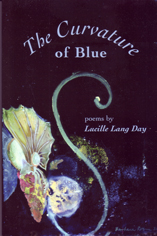 The Curvature of Blue by Lucille Lang Day
The Curvature of Blue by Lucille Lang Day
Červená Barva Press, 2009-
Description: The Curvature of Blue traverses an arc from the personal to the social and historical to the cosmic and philosophical. As a scientist and poet, Lucille Lang Day goes beyond celebration of the natural world to explore the intersections of science, nature, and human experience, and to meld scientific accuracy with intuition and emotional response. Whether writing about jellyfish, war, or her own experience, she draws attention to important questions and inspires us to think more deeply about what it means to be human and how our choices affect the planet Earth.
"In Lucille Lang Day's poems, stunning transformations of language cross the placenta barrier between the worlds of science and human emotion. She thinks and feels in color, enabling us to inhabit the complexity of the universe-as experienced at breakfast with a lover, in the wild with caribou, or in meditations on acts of historical horror-all made radiant by her lyric gifts and wisdom."
-Teresa Cader"Intelligence enjoying itself, awareness at play, attentiveness dancing through life's minefields: smiling at itself in its new black car ("Nor have I shunned onyx jewelry. That would be foolish"), Lucille Lang Day will at first glance make you smile and smile again. Then, with her scientist's mind, her woman's heart, her pain at injustice and evil, and her poet's eye and ear, she will carry you "through the mountains and canyons of space-time" to a fuller humanity. The Curvature of Blue is a wonderful book and I feel lucky to have read it"
-Alicia Ostriker"Is the sky blue? Day's poems paint it a hundred different ways, full of geometry and change, structure and feeling, as plangent as a sunset, as secret as an electromagnetic field. Divine love holds the physical parts together, even as human love and its marvelous stories are the substance of our lives. Here are witty, intelligent, affectionate poems making grand, skeptical comparisons and painting us and our shadows in brilliant colors--perfect poems for our time."
$15.00 | ISBN 978-0-692-00181-3 | 90 Pages | Out of stock
-F.D.Reeve
-
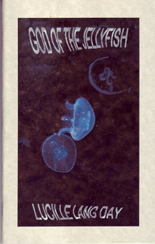 God of the Jellyfish
God of the Jellyfish
by Lucille Lang Day
Červená Barva Press, 2007 -
At once sacrilegious and reverential, the poems in God of the Jellyfish seek the divine in a natural world governed by the laws of science. In these poems, you'll find a god in the shape of a jellyfish, a prayer celebrating the color red, a man for whom music becomes the source of salvation, a vision of an earthly paradise populated by moon bears and moon rats, and a pilgrimage through 14 stations where Sisyphus, Shaker women, and howling wolves appear. Lucille Lang Day deftly couples scientific observations to the engine of imagination to take us on a magical and inspiring journey.
God of the Jellyfish shimmers in a space where "moon cacti bloom at night" and magpies can "fly over a field/of small glass bottles." The world Lucille Lang Day creates in her poetry is vivid and surreal yet always deftly anchored in the beauty and truth of the natural world. This is a small handbook of magic. When you read it, you'll find yourself transported to places you've never even dared to imagine.
—Susan TerrisThere are few contemporary poets who use science in their poetry at all, let alone use it as Lucille Lang Day does here, as an element, both dreamlike and hyperreal, in her gorgeous, moving global lyric.
$7.00 | 39 Pages | In Stock: 20
—Richard Silberg
Teneice Durrant Delgado
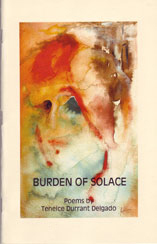 Burden of Solace Poems by Teneice Durrant Delgado
Burden of Solace Poems by Teneice Durrant Delgado
Červená Barva Press, 2012-
Teneice Durrant Delgado is a co-founder and poetry editor for Blood Lotus: an online literary journal, and a proud graduate of Spalding University’s Low-Residency MFA. She is the publisher and managing editor for Winged City Press Chapbooks and also serves on the editorial board for New Sins Press.
Teneice is originally from Akron, Ohio but currently lives in Dayton, Ohio. Her poems have appeared in the Valparaiso Poetry Review, The Heartland Review, The Furnace Review, Pirene’s Fountain, Glass, Pisgah Review, Soundings East and in two chapbooks: Flame Above Flame and The Goldilocks Complex. She is currently pursuing a degree in Community Counseling at the University of Dayton.
Author’s Note
I have strived to make this chapbook as historically accurate as possible. There is not much information on the Irish Slave trade, but I found Testimony of an Irish Slave Girl by Kate McCafferty and To Hell, or Barbados: the ethnic cleansing of Ireland by Sean O’Callaghan to be particularly insightful. I’m also grateful to Dr. Natalie Zacek for meeting with me after a random email and an even more random trip to Manchester, U.K.
"In Burden of Solace, Teneice Delgado’s poems guide us through the brutality of the Irish slave trade while making a clear and poetic argument for human resilience and dignity under seemingly unendurable circumstances. This poet’s ear is clearly tuned to the past. Delgado tells a story that needs to be heard and she gives deft voice to the resigned and defiant."
—Kathleen Driskel, Associate Professor of Creative Writing, Spalding University"In Burden of Solace, Teneice Durrant Delgado boldly examines pain, fear, inevitability, and the soul’s arduous endurance. These poems yield an understanding of human captivity from new, devastating angles, and they vividly convey the ways in which hope can wither and flare."
—Marcus Jackson, Cave Canem FellowIt is ironic that theorists proclaim we may be in a post-racial society. Since poets are truth-seekers and truth-tellers, more and more books being published - and lauded - investigate race. Teneice Durrant Delgado’s latest effort, from her poems “Susan” through “Jamaica,” delve both deeply and deftly into the Irish slave trade, which has not been widely discussed. The poems in this collection, “Solace,” offer us the opposite. The Ship’s name remains one thing, while the planks rattle and the “air stood thick.” Reading work like this is what we need to do. We must remember slavery, for it is “something ancient and rage-filled,” but also current and must become forever “forbidden.”
—Glenn Sheldon author of Angels of Anarchy
Not John
I admire
the way he takes flogs
without flinching, hate him
for his strength when I cry
out. I wait, watch
his eyes. They are the color
of boiling molasses. He won’t lean
into any white womb. He spits on my
red face on his way through the field.
He doesn’t speak much
English, not many of us
slaves, white or black, do. But
he knows enough to say
I am not John. The mulatto driver
laughs with his whip. Get in line,
Not John.
Not white, he says,
not John. Not John won’t
say his real name. Barbados
isn’t big enough. He will not waste
his mothers' tongues
on rotting, sugar
sharp mouths.
Reviews
Poetry Matters: Poetry Book Reviews and Interviews
http://readwritepoetry.blogspot.com/2013/02/a-review-of-burden-of-solace-and.htmlReview by Barbara Bialick:
$7.00 | 26 Pages | In Stock
http://dougholder.blogspot.com/2012/08/review-of-burden-of-solace-poems-by.html
William Delman
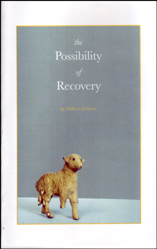 The Possibility of Recovery by William Delman
The Possibility of Recovery by William Delman
Červená Barva Press, 2009-
William Delman received the Academy of American Poets Prize at Boston University in 2006. His poetry has appeared in The Literary Review, The Massachusetts Review, Nimrod, Salamander, CT Review, Rhino, and other fine publications. He is the director of The Bay State Underground reading series at Boston University, and an editor at Agni Magazine.
Praise for "The Possibility of Recovery"
"William Delman sees with the encompassing range and stringent attention of true poetry: the haunted figures of a particular family are never far from the long reach of human history in these poems. Conversely, myth and epic, with all their imaginative force, are never far from the quirks and tragedies of actual American life."
-Robert Pinsky"To make it more real' are the first words uttered in this book, and they name the impulse that is at the heart of William Delman's poetry. Here is mortal illness, the violence of war, the long-lingering effects of trauma, the way soul-wounds pass from parent to child, such things that one might naturally flinch from. But here too is finely-textured language, haunted and haunting imagery, and a sharply incised poetic line, all of which teaches us 'the art of seeing things' and with that, the possibility of recovery."
-Fred Marchant"'Home, what is not here, and what is' Willian Delman's poems are intensely focused, mostly about domestic and familial history, but these seen, as in his wonderful poem, at once pitying and unrelenting, 'My Wedding Day in Brugge,' also in the context of our wars. The austere spareness of these poems is eloquent and moving."
$7.00 | 43 Pages | In Stock
-David ferry
Thad DeVassie
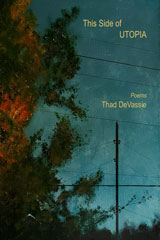 This Side of Utopia poems Thad DeVassie
This Side of Utopia poems Thad DeVassie
Červená Barva Press, 2023-
Thad DeVassie is a poet and writer who pivots between traditional line breaks of poetry and a linear love of prose poetry, flash fiction, and creative nonfiction. In 2020 he was named a winner of the James Tate Poetry Prize for his manuscript Splendid Irrationalities (SurVision Books). In 2021, his project Year Of Static, containing 11 original paintings with accompanying micro prose, was published by Ghost City Press. It evolved into the art exhibition Love Your Neighbor in 2022. A lifelong Ohioan, Thad writes and paints from the outskirts of Columbus.
This Side of Utopia straddles a fine line between how we think things should go and how they ultimately play out. With equal parts heartfelt longing and comic absurdity, these poems move effortlessly from the mundane to the magical, toggling between lined and prose poems. With a voice all his own, Thad DeVassie taps the haunting playfulness of Charles Simic, the otherworldly surprises of Russell Edson, showing this collection to be one continuous balancing act. Utopia might be an untenable idea, but subtle comforts and a few silver linings still exist in the here and now.
Cover art: "Before the Fall" by Thad DeVassie
$13.00 | ISBN: 978-1-950063-67-3 | 31 Pages
Jesse Mavro Diamond
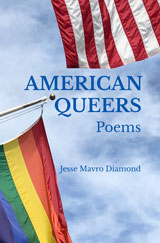 AMERICAN QUEERS by Jesse Mavro Diamond
AMERICAN QUEERS by Jesse Mavro Diamond
Červená Barva Press, 2023Jesse Mavro Diamond has been writing poetry since childhood, when at 7, she was the proud and delighted author of her first published poem, "Summer is Over." Throughout the next six decades, her writing has explored issues of deep interest to her including identity, gender politics and the diverse societal influences that shape our lives. Mavro Diamond's experiences as a Jewish woman, feminist, martial artist, and teacher of English Language Arts at both the secondary and college level has informed every aspect of her writing. She is the author of four plays and six volumes of poetry, including Swimming the Hellespont, whose title poem was chosen to be honored by the Tennessee Williams Literary Festival. Most recently, she developed and taught the first Creative Writing Course in Boston Latin School's 364-year History. Her work has been published and performed within the United States and internationally.
In 2004, when same-sex marriage was legalized in Massachusetts, Mavro Diamond married her partner of 27 years. They reside in the Boston area.
Jesse Mavro Diamond's poetry in AMERICAN QUEERS Impresses with historical vision and authenticity. Poems move seamlessly between contemporary and mythic worlds. Diamond's poetry combines a keen resistance to heteronormative culture with a lyric eroticism that evokes Sappho. The book will hit a nerve for anyone whose personal history is entrenched in the early gay rights movement but will equally resonate for those learning about the period through the nuance of its of its insights.
-Judson Evans, co-author of Chalk Talk and Professor of Liberal Arts at Berklee College of MusicIn AMERICAN QUEERS: Poems Celebrating Mid-Century Gay Activists, Jesse Mavro Diamond imagines a metaphoric kingdom inhabited by four relatively unknown gay and lesbian royal champions. With sharp wit and whole-hearted empathy, the poet extols and elegizes Stormé Delarverie, Richard Leitsch, Pat Parker and Charley Shively. Appending the poems with well researched biographical notes on each activist, diverse readers, students and teachers will discover the work is compelling and informative. AMERICAN QUEERS "impresses with historical vision and authenticity."
$18.00 | ISBN: 978-1-950063-77-2 | 54 Pages
(Judson Evans)
Diana Der-Hovanessian
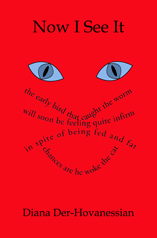 Now I See It Shaped Poems
Now I See It Shaped Poems
by Diana Der-Hovanessian
Červená Barva Press, 2011-
DIANA DER-HOVANESSIAN, author of 15 books of translations and ten volumes of her own poems, has been a Fulbright professor of American poetry twice and led workshops in poetry and the literature of human rights at many universities including Clark, Harvard, MIT, Southern Connecticut. Her awards include prizes from American Scholar, Prairie Schooner, the Paterson Prize, the Columbia U. Armand-Erpf Translation prize, N.E.A. and P.E.N. awards.
From the Forward
Poets have been playing with forms since the beginning of printed poetry. In the Middle Ages, many poems appeared in the shapes of altars and crosses, And in the fifties European poets began a combination of poster art and poetry, using flung words on the page and/or shaped verse.Diana Der-Hovanessian in her twenty years as a visiting poet in the Massachusetts schools found her students, especially younger ones, not only were fascinated by the forms, but enjoyed shaping their own.
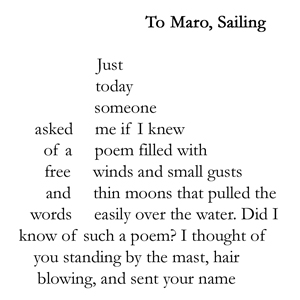
"Among our most readable and enjoyable American poets, Diana Der-Hovanessian stands high... if you think you don't like poetry, (her work) will quickly change your mind; if you're already a hopeless poetry addict, you'll be lavishly rewarded."
—X.J.Kennedy"The range and variety, (of her poems) from the witty and wry to the sad and poignant create a unique portrait of our time, as only superb poetry can"
—F.D. Reeve"Profoundly touching."
—Adrienne Rich"A brilliant poet who has opened up the book of her people to the English speaking world"
—D.M. Thomas, London Times Literary Supplement"Compelling , funny, sad, moving, doing all the things poems are supposed to do and usually don't"
—Joel OppenheimerCover Art: Maro Dalley
$13.00 | ISBN: 978-0-9831041-6-2 | 33 Pages | In Stock
Joseph DeRoche
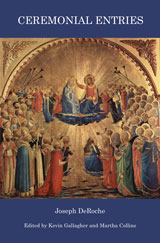 CEREMONIAL ENTRIES by Joseph DeRoche
CEREMONIAL ENTRIES by Joseph DeRoche
Edited by Kevin Gallagher and Martha Collins
Červená Barva Press, 2019-
Joseph DeRoche (1938-2013) taught at Northeastern University for many years. This collection gathers all of his published poems, and many of his unpublished ones.
ABOUT THE EDITORS
KEVIN GALLAGHER is a poet, publisher, and political economist living in Boston, Massachusetts with his wife, Kelly, kids Theo and Estelle, and dog Rexroth. His recent books of poetry are Radio Plays, And Yet it Moves, and Loom. Gallagher edits spoKe, a Boston-area journal of poetry and poetics. He works as a professor of global development policy at Boston University.MARTHA COLLINS is the author of nine books of poetry, most recently Night Unto Night and Admit One: An American Scrapbook. She founded the Creative Writing Program at U.Mass-Boston and served as Pauline Delaney Professor of Creative Writing at Oberlin College for ten years. Her tenth book, Because What Else Could I Do, is forthcoming from the University of Pittsburgh in fall 2019.
With razor-sharp wit and élan, Joseph DeRoche's poems remind us that revelation is never easy-that it often comes at great cost as we "loat to Paradise / In a slaughter / Of small things." DeRoche's poems are as formally taut as they are conversationally playful. His impeccable, architectural eye for detail creates a language that unmakes and reshapes the coercive structures that constrict our speech. In poems that delightfully blur the boundary between body and spirit, the individual human utterance becomes "an ordering / Against the furious weather / Of the world’s silence." Thanks to editors Kevin Gallagher and Martha Collins, a new generation of readers will now have the opportunity to experience the lyric grace and benevolence of DeRoche's brilliant poems.
-Tony Trigilio, author of The Complete Dark Shadows (of My Childhood), Book 1Joe DeRoche's poems are tough and tender minded-and tough and tender hearted. Artfully arranged from early to late, they begin by exploring contraries in conflict: ornamentation and spareness, say, or the starkly observed and the richly imagined. But their sharpest focus throughout is on the spiritual and secular frameworks used to assess the competing claims of body, mind, and soul, and of faith and doubt in divinity, love, and poetry itself. The collection's title says a sense of ritual unites the poems. It does, as their ceremonies lead from struggles between conflicting goods toward acceptance that the world and our experience of it is always sacred and profane: a place where Satan may be a saint and the light in an image of the infant Jesus Christ can seem as earthbound as celestial, where love can redeem and debase, where poetry can transform, disinfect, and merely feint or fail or cheat. DeRoche variously registers that acceptance in warm approval, bemused or startled recognition, or eerily calm alarm. Meanwhile, whether rhymed and metrical or free, his gay devotional verse repeatedly achieves the mysterious interaction between prosodic shape and developing content Robert Hass says is meant by poetic form.
$17.00 | ISBN: 978-1-950063-32-1 | 211 Pages
-Guy Rotella, professor Emeritus, Northeastern University, author of Castings: Monuments and Monumentality in Poems by Elizabeth Bishop, Robert Lowell, James Merrill, Derek Walcott, and Seamus Heaney
Ellen Devlin
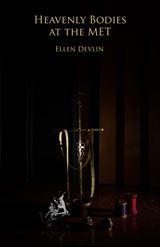 Heavenly Bodies at the MET by Ellen Devlin
Heavenly Bodies at the MET by Ellen Devlin
Červená Barva Press, 2023Ellen Devlin is the author of two chapbooks, Rita, (2019) and Heavenly Bodies at the MET (2023). Her poems can be found in The Cortland Review, Ekphrasis, Lime Hawk Review, PANK, The New Ohio Review, The Sow's Ear and Women's Studies Quarterly Review. and other journals, most recently Beyond Words, 2023, Muleskinner 2023, and The Westchester Review, 2023. She lives in Irvington, New York with her husband, Charles.
"Heavenly Bodies at the Met explores the ecclesiastical garments created by well known designers inspired by Catholic liturgy. In this collection, Ellen Devlin describes the various gowns and garments with the descriptive eye reminiscent of Elizabeth Bishop. Many of the garments become reflective journeys through the poet's own life. Each supplies an emotional awareness that is rendered in vivid, concise language. This a deeply human collection, a personal confrontation and examination of the poet's life and as you read perhaps your own."
-Kevin Pilkington, author of Playing Poker With Tennessee Williams"This is my body / my silken birthright. / sieve me for sin / and fragrant apples fall from / bee-studded trees," writes Ellen Devlin in Heavenly Bodies at the MET, her gorgeous, glowing testament to the costume exhibit of that name. Speaking to how the exhibit at the Metropolitan Museum of Art exalted the female form in haute couture gowns inspired by Church history, Devlin embraces the divine and the quotidian, the elegant sweep and the stunning detail, reminding us, as "silver roses abundant bloom / from her shoulders /cross breasts and hips / with botanical precision-" that each dress, each poem, in its innermost essence, holds the true grace of the numinous feminine: "the casing of her holiness / the beating heart of a living woman." Reader, come and let your senses be clothed in such beauty.
$13.00 | ISBN: 978-1-950063-57-4 | 28 Pages
-Gillian Cummings, author of The Owl was a Baker's Daughter
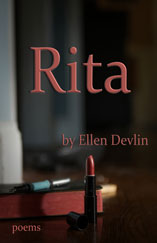 Rita by Ellen Devlin
Rita by Ellen Devlin
Červená Barva Press, 2019-
Ellen Devlin's poetry has been published or is forthcoming in The Cortland Review, Ekphrasis, Lime Hawk Review, PANK, The New Ohio Review, The Sow's Ear and Women's Studies Quarterly Review. One chapbook is forthcoming from Cervena Barva Press, "Heavenly Bodies at the MET." She lives in Irvington, New York, with her husband, Charles.
Ellen Devlin's Rita is as subversive as it is wise. Rita's sassy "talk backs" to heroines from the canon may be feminist retellings but Devlin's project is more complex. Each insightful warning, discussion, or interrogation (with female characters of carefully chosen seminal texts) explores necessary questions of identity, agency, free will, power, and complicity. These poems are instruments of power-asserting, imagining, describing what it's like to be a woman today. I wish I read this book when I was a young woman. This is no ordinary debut collection; Devlin's attention to craft is masterful and her language fresh and fierce. "The windows and doors are locked and I can feel/ my mother's life barreling towards me."
—Jennifer Franklin, author of No Small Gift (Four Way Books, 2018)It isn't often that a book of poems introduces us to a character we get to know as deeply as we know our closest intimates, or ourselves. Ellen Devlin achieves this with Rita, wielding an unfailing eye for detail and ear for voice. Rita is a middle-aged woman, uncelebrated in her world and ours, living with "a pile of ideas about being seen/not seen." As a reader, she talks back to a series of heroines who, tempted by "luminous sin," seem poised to stumble (as we know they will) into the perils that can befall the desirous female body. She shops at the supermarket, goes to her book club, nurses her memories. She accepts both horror and pleasure with her unique intensity and detachment. In the end, this unique sensibility is what saves Rita and burnishes these poems. She compels our interest, our awe and our love.
—Kathleen Ossip, author of The Do-Over (Sarabande Books, 2015)Photograph and cover design by Hugh Scully
$8.00 | ISBN: 978-1-950063-13-0 | 36 Pages
T. M. De Vos
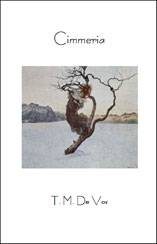 Cimmeria by T. M. De Vos
Cimmeria by T. M. De Vos
Červená Barva Press, 2016-
T.M. De Vos is a 2015 Sozopol Fiction Seminars fellow; Co-Editor-in-Chief of Gloom Cupboard; and staff member of The Atlas Review. Her work has appeared in Juked, The Pacific Review, burntdistrict, Moonshot Magazine, Quiddity, Hawaii Pacific Review, Painted Bride Quarterly, and the Los Angeles Review, among others. She has been named as a semifinalist for the Yale Series of Younger Poets Award and the Paumanok Poetry Award. De Vos is also the recipient of fellowships from Murphy Writing Seminars, Summer Literary Seminars, and the Cullman Center at the New York Public Library. She is currently working on her first novel.
"Some poets jump up and down, make faces, pretend to act smart, or witty, or stupid as they write. T.M. De Vos comes up to your table as you sit alone in a cafe, sits down in the empty chair, and starts talking to you in near whisper. You're surprised at first, don't know how to react, but are soothed by the softness of her voice, the warmth it projects, push out of your mind the din than surrounds you, and let yourself be drawn in by her words. There isn't a single lie, a hint at pretense in what she says. It is all so honest and simple. Her story is yours but she tells it in a way you would have never thought of and you see yourself differently. You're amazed. You're grateful to her for having sat down at your table. You've gained a friend."
-Yuriy Tarnawsky, author of The Placebo Effect Trilogy"An illuminating collection, Cimmeria inspects human intimacies. These poems are at once clinical and compassionate as they slip from the ordinary to horror, from a boy's red balloon to his bag of blood. T.M. De Vos enlarges as she vexes our grounding in the everyday."
-Renato Rosaldo, cultural anthropologist and author of Diego Luna's Insider Tips"Cimmeria plumbs modern relationships from intimate perspectives. The poems talk from across the room, then sit down and whisper unexpected truths. Where the 21st century keeps the bright and beautiful at the forefront, De Vos provides a rich depth of field that shows there is nothing of significance to fill the vacuum left from loss."
-John Gosslee, editor of Fjords Review and author of 12: Sonnets for the Zodiac"In her collection Cimmeria, poet T.M. De Vos opens up a complex world of brutal emotional pain delivered in elegant, precise, yet emotive language. We are taken through a landscape scarred by anguish and littered with memories ground down to a powder by unsuccessful, at times stifling relationships. But the look back upon this scorched earth of ardent scars is that from a vantage point of forgiveness and transcendence. De Vos is magically able to simultaneously condemn and absolve the cruelty that lives within all of us."
-Alex Pruteanu, author of Gears"T.M. De Vos reaches beneath the surface of experience to examine what is primary and primordial in everyday-and not so everyday-actions. Her examinations sometimes cut like a surgeon's knife, other times magnify like a biologist's microscope, to reveal what (often) has been taken away from those who try to give. The precision of her language and clarity of her imagery open our eyes to what has remained hidden, buried and closed off for too long."
-Thaddeus Rutkowski, author of Haywire, Tetched, and Roughhouse"T. M. De Vos sounds the depths of what we truly know. With tremendous tenderness, yearning and passion in her voice, she gives us the visceral truth, including the literal blood, bone and guts of experience. By knowing where the limits of desire come from, herself, she is able to wisely accept what it is that life offers."
$7.00 | 36 Pages | In Stock
-Jeffrey Ethan Lee, author of Towards Euphoria
Svet DiNahum
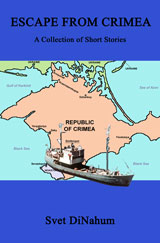 Escape from Crimea A Collection of Short Stories by Svet DiNahum
Escape from Crimea A Collection of Short Stories by Svet DiNahum
Červená Barva Press, 2020-
Svet DiNahum was born in 1970 in Sofia, Bulgaria, and is of Jewish ancestry. He is a graduate of the Department of Philosophy at Southern Illinois University and currently lives in New York City, Sofia, Vienna, and Frankfurt. He has published short stories in numerous literary magazines in Bulgaria and throughout Europe; his work has been translated into English, German, Russian, Serbian, Turkish, Spanish, and French. His fiction has appeared in US literary magazines such as Drunken Boat, Gloom Cupboard, Danse Macabre, and Audience. DiNahum is the author of The Wolf's Howl (Short Novel, 1994); The Unicorn in Captivity (Collection of Short Stories, 2007), RAPTUS (Novel, 2009) Nicola Against Nicola (Short Novel & Screenplay, 2012), The Doctrinaire (Novel, 2015), and The Hangman and the Clown (Stage Play, 2017). RAPTUS was a nominee for the Elias Canetti National Literary Award and was subsequently published in the United States by Hammer & Anvil Books (Las Vegas, 2013). DiNahum serves as Press Secretary for PEN Center Bulgaria, defending human rights and freedom of expression.
Winner of Essay Competition for World Noble Peace Prize Laureates 2013 in Warsaw (and Lech Walesa Foundation) with his essay Solidarity Restarted. Author of screenplays: The Second Life of Michael Jackson (2011), The Unicorn In Captivity (2012), Rays (2013) In 2012 wins BTV competition for sitcom episode (TV comedy series Home Arrest). Author's website: www.svetdinahum.com Contact: sdnahum@gmail.com
To the readers in USA:
Dear American friends,
For writing the truth about the Russian occupation of Crimea, I've been persecuted and harassed in Bulgaria by organizations that are defending the interests of Putin's regime in the Kremlin. I've been targeted by a campaign aimed at discrediting me. I've also been threatened - indirectly - with so-called 'friendly advice' - a Bulgarian Union of Writers member told me personally after the book launch: "You be careful. You are making a provocation. They are organizing things so you'll be defeated." Then, referring to the nerve agent used against a former Russian military intelligence officer who defected to Britain, that same "friend" warned me: "You might eat Novichok just like Sergei Skripal."But I am walking on the path of truth and I have passed the line of fear. I'm not going to give in.
-Svetoslav Nahum, Author, Escape from Crimea
"Escape from Crimea reveals the terrible events that we experienced in Ukraine - the criminal occupation of Crimea. Events are described with talent. The written words will not leave anyone indifferent. I am grateful to Svetoslav Nahum for his skill. This is a serious and significant book."
-H.E. Vitaliy Moskalenko, Ukraine's Ambassador to Bulgaria"Escape From Crimea is getting much more attention this way with a much larger audience in USA. Nahum's work is an accurate depiction of events in Russia-occupied Crimea. I hope this book will also draw attention in the West to the suffering that so many Ukrainians have been through because of the Russian occupation and because of Russia's military aggression in eastern Ukraine."
-Ron Synovitz, Radio Free Europe, PraguePhotographs: Natalia Zhurminskaya
$18.00 | ISBN: 978-1-950063-41-3 | 123 Pages
Carol Dine
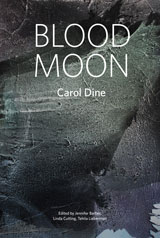 Blood Moon by Carol Dine
Blood Moon by Carol Dine
Edited by Jennifer Barber, Linda Cutting, Tehila Lieberman
Červená Barva Press, 2025-
Carol Dine was a celebrated poet, essayist, and memoirist. Art critic and author John Berger wrote of Dine's Van Gogh in Poems (Bitter Oleander Press, 2009), "Her observation of [Van Gogh's] drawings equals his observation of what he was drawing." Dine read from the book at the Van Gogh Museum, Amsterdam, and the Royal Academy of Arts, London. Her memoir, Places in the Bone (Rutgers University Press, 2005), which combines prose and poetry, deals with the redemptive power of art. Her poems appeared in numerous literary magazines, including Aesthetica Creative Arts Annual (U.K.), Bitter Oleander, Boulevard, Inkwell, Lilith, and Salamander, as well as within the anthologies After Shocks: Poetry of Recovery and Poems Against War: Bending Toward Justice.
Dine received a grant from the Barbara Deming Memorial Fund and the Sword of Hope from the American Cancer Society. She lived in Brookline and she taught writing at Suffolk University and the Massachusetts College of Art & Design.
In addition to Van Gogh in Poems and Places in the Bone, her previous books include Naming the Sky, Trying to Understand the Lunar Eclipse, and Orange Night.
Blood Moon explores twentieth and twenty-first century history through the stories of women who acted heroically under the most extreme circumstances, at great personal danger, during wartime and times of political oppression. It also focuses on the lives of women artists who documented the violence of their times through their art. The author drew on many memoirs in the writing of this collection, and the poems are both powerful and redemptive.
Dine's poems about women in extremis are pressed and compacted like diamonds. Her ability to empathize so completely with brave women who suffered terribly, in wartime, from the never-ending human appetite for cruelty, moved me profoundly. I have read Blood Moon over and over, and in my opinion, there is true greatness here. This volume of poetry surely deserves a place in the canon.
—Michael Sandle, British sculptor and artistCarol Dine's poetry has always engaged. Immersed in her subjects, committed to their individual lives as humans, her language had to pursue, with deep compassion and trust, a full understanding of what it means to suffer and sometimes not survive life's unexpected consequences. We can be thankful for the path she opened up for us and the work she left behind so we, too, could observe the lives portrayed in Blood Moon.
—Paul B. Roth, Editor, The Bitter Oleander PressCover Image: SoHyun Bae, Jasper Lake: Wings, 2011, rice paper and pure pigment on canvas, 200 x 150 cm
$18.00 | ISBN: 978-1-950063-96-3 | 82 Pages
Milan Djurasovic
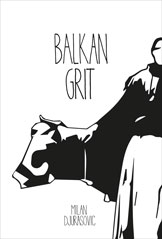 Balkan Grit by Milan Djurasovic (fiction)
Balkan Grit by Milan Djurasovic (fiction)
Červená Barva Press, 2019-
Milan Djurasovic is a Bosnian American writer, artist and journalist. He currently lives and works in Sacramento, California. His educational background is in psychology and Russian literature. Milan has published dozens of articles and short stories in various international magazines. His most recent publication includes a book of fiction No More Happy Endings (published in 2016).
Balkan Grit is a collection of short stories that explores the psychology of characters who are trying to shield their sanity and hope while coping with loss and bleakness in a post-war society. Neglected and abused, without a prospect for a normal life, they are rendered bitter and cynical. Some try to make sense of their daily troubles and newly imposed external values by holding onto a familiar way of life and a deeply rooted moral code. Others become subdued and frozen in time in a world full of abrupt change and cruelty.
Cover Design: Aleksandra Djurasovic
$17.00 | ISBN: 978-1-950063-21-5 | 80 Pages
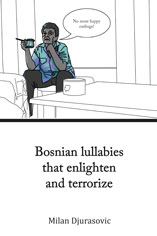 No More Happy Endings by Milan Djurasovic
No More Happy Endings by Milan Djurasovic
Červená Barva Press, 2016Milan Djurasovic is a Bosnian Serb from Mostar, the descendant of delightful peasants and modest working-class stock. He lives in northern California, where he works as a paraeducator. No More Happy Endings is his first collection of poems and short stories.
"The bedtime stories of my grandmother, Baba Jela, changed after the Bosnian civil war. Before the shooting began, her stories were ordinary, positive, life-affirming, with a clever hero or good-natured idiot overcoming challenges and a greedy foe soon reduced to a pitiful scrub. At the end, the world would turn out rosy and just, and taking part in it made sense. But after a war of nearly 100,000 deaths, millions of displaced bodies and souls, and decay peering out of every crevice, such propriety seemed unnatural. So Baba Jela decided to get rid of it. While other elderly men and woman decided to end their own lives after realizing that nothing would ever again be the way it was before the war, Baba turned her stories and lullabies dark and horrifying, her own way of refusing to play along with uncontrollable circumstances."
Cover Design: Aleksandra Djurasovic
$12.00 | ISBN: 978-0-9966894-8-9 | 30 Pages | In Stock
Susan Donnelly
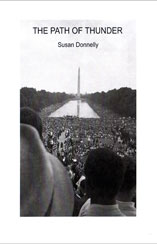 The Path of Thunder by Susan Donnelly
The Path of Thunder by Susan Donnelly
Červená Barva Press, 2017-
Susan Donnelly's latest publication is the chapbook Sweet Gooseberries from Every Other Thursday Press. She is the author of three full collections: Eve Names the Animals (Northeastern University Press), Transit and Capture the Flag (Iris Press), and three other chapbooks. Her poems have appeared in The New Yorker, The Atlantic Monthly, Poetry and many journals, anthologies and textbooks in the U.S. and abroad, as well as on websites, in academic courses, and on blogs. They have also been featured several times on Garrison Keillor's The Writers Almanac. A frequent reader of her poetry in the Boston area and beyond, Susan lives, writes, and offers poetry classes and consultations in Arlington, Massachusetts.
One writer's experiences finding a path in racially divided America.
"The heart opens/ in such unlikely places" writes Susan Donnelly and her poems give us what she sees and understands in those moments, offering us a way to grasp the world in which the heart might stay open. These are poems to be shared across a table, to knit us together, to face us toward the truth of our common life. This is, as Roque Dalton suggested, "Poetry like bread." Wine, too. What a sublime and nourishing book of poems.
$7.00 | 27 Pages | In Stock
-Richard Hoffman, author of Gold Star Road and Emblem
Rodica Draghincescu
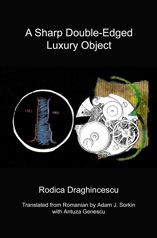 A Sharp Double-Edged Luxury Object
A Sharp Double-Edged Luxury Object
by Rodica Draghincescu
Translated from Romanian by Adam J. Sorkin with Antuza Genescu
Červená Barva Press, 2014-
Cover Art: Devis Grebu
Rodica Draghincescu, born in 1962 in Buziaş, a town in the province of Timiş in the west of Romania, and now living in the region of Metz in France, was called by World Literature Today "one of the most spectacular figures in the new Romanian literature of the 1990s." She has published prize-winning books of original poetry and prose fiction in Romanian and in French (both in France and Canada), as well as translations, interviews, and essays. Her work has also appeared in translation in England, Belgium, Italy, Spain, Sweden, Switzerland, and the United States. In 2006 Draghincescu was awarded the "Le Lien" Prize for Poetry in Nancy-Metz, France, and in 2013 the "Virgil" Prize for European poetry in Paris. Since 2007 she has served as Artistic Director of the International Poetry Festival of Metz and consultant for arts education to the institutions of culture of Lorraine, and she is editor-in-chief of the multilingual web-magazine Levure littéraire and on the editorial board of the German review Matrix.
About the Translators:
Adam J. Sorkin is a translator of contemporary Romanian literature, whose work has won the Poetry Society (U.K.) Corneliu M. Popescu Prize for European Poetry Translation for 2005, as well as the Kenneth Rexroth Memorial Translation Prize and the Ioan Flora Prize for Poetry Translation. In 2011, he published A Path to the Sea by Liliana Ursu, translated with Ursu and Tess Gallagher (Pleasure Boat Studios—Silver Award winner in poetry as a ForeWord Reviews Book of the Year), Ioan Flora’s Medea and Her War Machines, translated with Alina Cârâc (University of New Orleans Press—third-round selection for the National Translation Award), Ion Mureşan’s The Book of Winter and Other Poems, translated with Lidia Vianu (University of Plymouth Press), and The Vanishing Point That Whistles: An Anthology of Contemporary Romanian Poetry (Talisman House). In 2012, Mouths Dry with Hatred by Dan Sociu, translated with the author (Longleaf Press), and The Flying Head by Ioan Flora, translated with Elena Bortă (Toad Press), both appeared. Sorkin is Distinguished Professor of English at Penn State Brandywine.Antuza Genescu is a free-lance translator who lives and works in Timişoara in the west of Romania. Her translations of Rodica Draghincescu with Adam J. Sorkin have appeared in literary publications in the United States, the Netherlands, and Slovenia, both in print and on the web.
Reviews:
Boston Area Small Press and Poetry Scene:
$17.00 | ISBN: 978-0-9910091-2-1 | 41 Pages | In Stock
http://dougholder.blogspot.com/2014/05/a-sharp-double-edged-luxury-object.html
Sherri Felt Dratfield
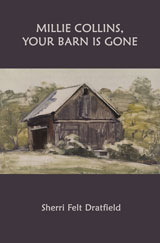 Millie Collins, Your Barn is Gone by Sherri Felt Dratfield
Millie Collins, Your Barn is Gone by Sherri Felt Dratfield
Červená Barva Press, 2021-
Sherri Felt Dratfield graduated from Goucher College and is a member of the Phi Beta Kappa Society. She received an M.F.A. in Acting from the University of Denver and holds a J.D., with election to Order of the Coif, from New York University School of Law. Sherri is the author of two previous collections of poetry, The City (Finishing Line Press, 2013) and Water Vigils (Finishing Line Press, 2014). Both collections were nominated for a Pushcart Prize. Her poems have appeared in various journals and anthologies and have been awarded recognition in the Margaret Reid Contest for Traditional Verse, Jewish Currents' Raines Poetry Competition and the Passager Poetry Contest. Sherri lives in the West Village of Manhattan with her husband, Simon. They visit their shore home in Ventnor City, New Jersey during all seasons.
Sherri Felt Dratfield's new collection Millie Collins, Your Barn Is Gone explores change, loss, healing and renewal. Its sections correspond to Ecclesiastes' "to everything there is a season..." The poems take us from Venice, Italy to the seashore to the cafes of New York City; from learning a vaudeville song with Jimmy Durante to engaging the Madona in a Bellini Triptych to examining the divinity of an egg.
Sherri Felt Dratfield goes from strength to strength in this, her third book of poems. Gazing on minute details, she finds miracles in ordinary life, whether on city streets, on the shore, in her beloved Venice, or in her childhood. She writes joyfully of the woman on a dune, Murano leaves, a remembered song. And yet, devoted as she is to earthly realities, an underlying mysticism pervades this collection. Reading it, we are taken far beyond and under and above the world she captures in words to a place where only silence prevails. This is the remarkable effect of "Two O'Clock Bells," in which she watches the Campanile and hears, "three bells in unison./ I saw sound and felt life echo - /brief, gone."
-Grace Schulman, Winner of the Frost Medal for Distinguished Lifetime Achievement in American Poetry and Member of the American Academy of Arts and LettersThe exquisite poems in Sherri Felt Dratfield's brilliant, luminous Millie Collins, Your Barn Is Gone draw on mythology and geography to explore themes of identity, memory, love, and loss. At once spiritual, intimate and worldly, they weave a rich tapestry of alchemical music. Inhabited by recurring angels, bristling with flurries of animals and a cornucopia of flowers, this collection is a feast for all the senses and a testimony to the redeeming power of beauty. To read Felt Dratfield is to be edified and entranced. She takes us down the rabbit hole in the magical "Arboreal," one of several stunning ekphrastic poems. Her timeless, exacting poetry lavishes us with blessings that "course veinlike through [our] hearts" and like "stronger tides forge fiercer bonds."
$18.00 | ISBN: 978-1-950063-07-9 | 97 Pages
-Hélène Cardona, Independent Press Award and International Book Award Winner
Alexander G. Dryer
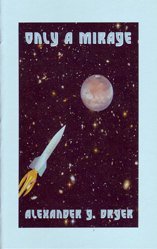 Only A Mirage by Alexander G. Dryer
Only A Mirage by Alexander G. Dryer
Červená Barva Press, 2009-
Červená Barva Press starts a children's poetry chapbook series. This is by solicitation only. Any manuscript received will be returned unread. Červená Barva Press is proud to publish our first in this series by Alexander G. Dryer. He is an excellent writer way beyond his age. We are very proud to publish this chapbook but will not publish where Alexander lives or any personal information about him since he is a child.
Alexander Gregory Dryer composed the poems in this book during the eighth, ninth, and tenth years of his life. He loves writing poems, but does not force the ideas onto paper or give himself deadlines. He really loves when the ideas just flow. Alexander says that his Auntie Woo-Woo is a source of inspiration for his poems. When asked to describe the room he writes in, he said, "It is a quiet room with lots of books, organized writing supplies, and my Lego creations."
Alexander lives with his mom, dad, two cats, and dog. He enjoys school, reading, learning to play the violin and piano, and building with Legos. When he grows up, he wants to be a paleontologist and a professional violinist.
Three Desert Haiku
I. Prickly cactus grows
Very high above the ground
And resists the wind.II. Lake in the desert
Glistens brightly in the sun
Only a mirage.III. Snake slithers quickly
$5.00 | 18 Pages | In Stock
To catch a spotted lizard
That darts in the sand.
John Dufresne
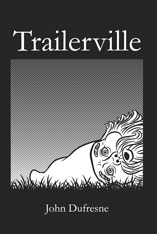 Trailerville by John Dufresne
Trailerville by John Dufresne
Červená Barva Press, 2015-
John Dufresne is the author of two short story collections, The Way That Water Enters Stone and Johnny Too Bad, and the novels Louisiana Power & Light, Love Warps the Mind a Little, both New York Times Notable Books of the Year, Deep in the Shade of Paradise, and Requiem, Mass. His books on writing, The Lie That Tells a Truth and Is Life Like This? are used in many university writing programs. He’s the editor of the anthology Blue Christmas. His short stories have twice been named Best American Mystery Stories, in 2007 and 2010. He's a professor at Florida International University in Miami. He is a 2013 Guggenheim Fellow in Fiction. His latest novel is No Regrets, Coyote. A sequel, I Don't Like Where This Is Going will be published in April 2016.
It's Labor Day weekend at the Trailerville Mobile Home Park in Ouachita Parish, Louisiana. Merdelle Harris's husband of forty-one years is rapidly deteriorating with Alzheimer's. She is determined to care for him, to save him if she can. In saving Bobby she's saving her own life, she believes. There are days he doesn't know her, doesn't know himself. Arlis Bryant lives in the trailer next door with his daughter, her three kids, and her beer-drinking, hot-tempered boyfriend. It's awful crowded in there, and the boyfriend thinks someone needs to go. Arlis has fallen for Merdelle, and his attentions are both a comfort and a torment to her. She has to choose between the man who loved her once and the man who loves her now, between the past and the future.
Trailerville, the first play by novelist John Dufresne, is all about love, in all its flavors: first love, unrequited love, unbridled passion, doomed young love, the love of parents for an adult child they don't really understand, the love that grows over time in a marriage, love that is blind to the beloved's faults (even if no one else is), and ultimately, what it means to love yourself. This may sound like a recipe for heartwarming romantic comedy, so let me note that one of Dufresne's strengths as a novelist is his ability to undercut sentimentality with black humor; that talent is in evidence here as well. But Trailerville is also a very sad play, because it acknowledges that love is messy and complicated and often hurts as much as—or more than—it heals.
—Loren Noveck, nytheatre.comTrailerville delivers big laughs and a bittersweet glow.
$15.00 | ISBN: 978-0-9966894-2-7 | 112 Pages | In Stock
—Flavorpill
Milutin Durickovic
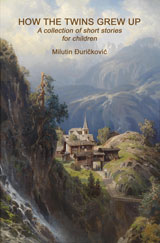 How The Twins Grew Up A collection of short stories for children
How The Twins Grew Up A collection of short stories for children
by Milutin Durickovic
Červená Barva Press, 2021-
Milutin Djurickovic was born on 1967 in Decan. He earned his doctorate at the Faculty of Philosophy in East Sarajevo. He works as a professor at the College of Professional Studies for Educators in Aleksinac. Member of the Serbian Royal Academy, World Union of Poets, Association of Writers of Serbia and the Association of Journalists of Serbia. He published 60 books for children and adults (poems, novel, story, critic, monography, anthology...). He lives in Belgrade.
$8.00 | ISBN: 978-1-950063-47-5 | 32 Pages
Home | Červená Barva Press Books | Poetry Chapbooks | Poetry Books | Anthologies | Fiction | Flash Fiction | Literary Journals | Non-fiction | Plays | Memoirs | Used Books | Audio CD's
